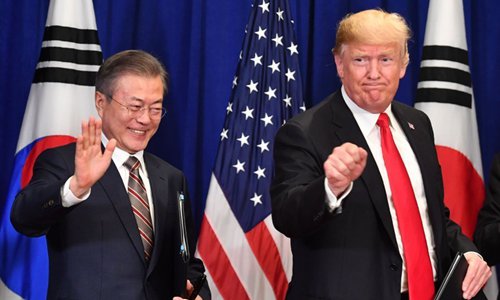China’s role paramount in resolving NK issue
Source:Global Times Published: 2019/6/25 17:38:40

File Photo: Xinhua
US President Donald Trump is scheduled to pay a two-day visit to South Korea on Saturday and Sunday. Before the visit was announced, South Korean President Moon Jae-in had already invited Trump several times, aiming to elevate Seoul's diplomatic status.
The US and North Korea were on the verge of war at the end of 2017, when South Korea did a lot to mediate. Around the first summit between Trump and North Korean leader Kim Jong-un in Singapore in June 2018, Seoul showed its importance as a mediator.
After the second Kim-Trump summit in Hanoi in February ended without results and US-North Korea relations stagnated, the situation on the Korean Peninsula once again became uncertain. Coupled with the relatively indifferent attitude of Pyongyang, Seoul's diplomatic influence and status weakened significantly. South Korea has also seen a worsened relationship with Japan, which wants to play an active role in the denuclearization issue. South Korea now is in a relatively embarrassing position and somewhat isolated.
President Moon has gained support largely because of the situation on the Korean Peninsula, along with the South Korean people's hope for peace, for the gradual opening-up of North Korea, for the lifting of sanctions on Pyongyang, and for the creation of an ideal environment. If Moon cannot make a difference in these aspects, his approval ratings will be affected.
Taking advantage of the opportunity provided by some international occasions, South Korea has appealed for a third meeting between Trump and Kim so as to increase the country's own global influence and show that it is capable of diplomatic mediation.
Whether there will be a third Kim-Trump summit depends on Washington and Pyongyang, and perhaps on Beijing as well, but not on Seoul. The state visit of President Xi Jinping to North Korea from June 20 to 21 has straightened out new orientation for Beijing-Pyongyang ties. Hence, China's role in promoting denuclearization on the Korean Peninsula could be much bigger than that of South Korea.
Although Seoul is willing to be a mediator, many issues including geopolitical security in Northeast Asia and the Korean Peninsula are dominated by big countries. What Seoul is doing is nothing more than trying to maximize its diplomatic influence and national interests under the shadow of bigger powers.
It is obvious that Moon wants to raise South Korea's status by making use of the upcoming G20 summit and having Trump visit his country. On the other hand, Trump himself hopes to use the opportunity to exert his influence.
His visit to South Korea will be conducive to consolidating US-South Korea-Japan ties, mending the relationship between Seoul and Tokyo, and improving South Korea's importance in the denuclearization issue under the framework of the US-South Korea-Japan alliance.
Moreover, Trump wants South Korea to cooperate more with the US Indo-Pacific Strategy, defend US interests in Northeast Asia and support the established geopolitical and security policies of the US on the Korean Peninsula.
However, if North Korea seeks a bilateral approach with the US, there won't be much that South Korea can do. In addition, the strengthening of the traditional friendship between Beijing and Pyongyang and Xi's state visit to North Korea will increasingly consolidate ties between the two countries and promote dialogue to politically resolve the situation on the Korean Peninsula.
At the UN level, China will do something pragmatic to appeal for a staged process of denuclearization and partial lifting of sanctions on North Korea to create a benign environment for the country to develop its economy and carry out reform and opening-up.
In a signed article published in North Korea's mainstream media outlet Rodong Sinmun, Xi made the remark that "the general trend of peaceful dialogue on the Korean Peninsula has taken shape." Such a trend cannot be reversed and the US could not bring back tensions with North Korea similar to those in 2017.
Amid Trump's campaign for re-election, his administration's real intent is a peaceful solution to the Korean Peninsula nuclear issue, and it needs to settle the issue in a peaceful way although it insists that "maximum pressure" must remain on North Korea.
We can clearly see in the US moves that it is contending with China for North Korea. But it won't achieve its aims by throwing its weight around in an uncompromising way.
After the G20 summit, the stalemate on the Korean Peninsula is expected to ease. There could be a new round of bilateral or multilateral diplomatic efforts and political exchanges to promote peaceful talks between the US and North Korea. The international community will also strive to lift sanctions on North Korea and achieve denuclearization on the Korean Peninsula. The process will need roughly another five to 10 years.
Although there are still uncertainties in the trade friction between China and the US, the two countries need stable and sound development in the long term. They are willing to negotiate and demand benign cooperation on the Korean Peninsula. In this regard, Xi's state visit to North Korea is likely to create a new opportunity to promote the process of denuclearization.
The US-launched trade war against China is not necessarily linked to the Korean Peninsula nuclear issue. However, alleviation of China-US tensions and an improved situation on the peninsula could benefit both countries. If China and the US reach even a limited agreement during the G20 summit, Beijing can put in more efforts into resolving the row on the Korean Peninsula.
The article was compiled by Global Times reporter Xu Hailin based on an interview with Da Zhigang, director of the Institute of Northeast Asian Studies at the Heilongjiang Provincial Academy of Social Sciences. xuhailin@globaltimes.com.cn
Posted in: OTHER REGIONS